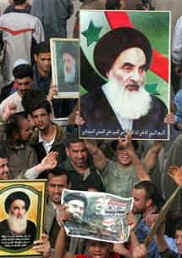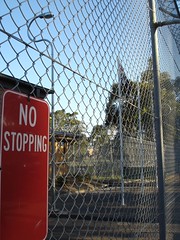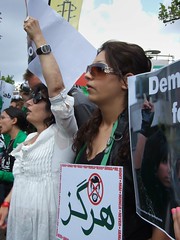 Image via Wikipedia
Image via Wikipedia
Source:
Der Spiegel (via
Welcome To A Pakistani Humanist's World!)
By Juliane Von Mittlestaedt/Daniel Steinvorth
Translation by Faris Malik of
Queer JihadIn most Islamic countries, homosexuals are despised, persecuted and sometimes even killed. Repressive regimes foment hatred against "effeminized men."
Bearded men kidnapped him in the middle of Baghdad, threw him into a dark hole, bound him with a chain, urinated on him and beat him with an iron pipe. But the worst moment of all for Hisham, 40, came on the fourth day when his abductors called his family. He became scared they would tell his mother that he was homosexual and that this was the reason they had abducted him. Then he would never see his family again. The shame would be unbearable for them.
"Do what you want with me, but don't tell them!" he cried.
Rather than humiliate him in front of his family, the abductors demanded 50,000 dollars in ransom, a huge sum for an ordinary Iraqi family. The parents had to borrow money and sell all of their son's possessions. A short time later, the abductors threw Hisham out of a car in northern Baghdad. They did not shoot him, they let him walk, but they yelled after him: "This is your last chance. If we see you again, we'll kill you."
That was four months ago, and Hisham has gone to Lebanon. Helies to his family, telling them he was fleeing violence and terror, and had found a job in Beirut. He kept it to himself that, as a gay man, he could not remain in Iraq because of the death squads that are hunting down "effeminized" men.
At the beginning of the year in Baghdad, there began a new series of murders of men suspected of homosexuality. They are often raped,their genitals cut off, their anuses glued shut. Their corpses end up in trash dumpsters or on the street. There is a "systematic campaign" with hundreds ofmurder victims, according to Human Rights Watch, which has documented this string of violence.
The trigger for the murders, rapes and kidnappings isconsidered to be the video of a party in Baghdad in the summer of 2008, at which men danced with one another. It was viewed thousands of times on handheld devices and the Internet. Islamist preachers then began agitating against the spreading danger of a "third sex," brought into the country by American soldiers. Especially followers of radical Shiite leader
Muqtada al-Sadr have since then felt called to restore "religious morality." Their black-clad militiamen patrol their bastion, the Sadr City district of Baghdad, and lie inwait for everyone whose "unmasculine behavior" catches their attention. Longhair, tight t-shirts and pants, or a strutting walk often enough bring a death sentence.
Other groups, too, not only the Mahdi Army, are said to be involved in the murders of gays: for instance, Sunni militia who are close to Al-Qaida, but also Iraqi security forces.
The lives of homosexuals are particularly endangered in Iraq at the moment, but they are ostracized virtually throughout the Islamic world.More than 100,000 women and men are discriminated against or threatened,according to gay groups. Thousands commit suicide, end up in prison, or have fled.
More than 30 Islamic countries prohibit homosexuality bylaw. The punishments range from flogging to life in prison. In Mauretania, Bangladesh, Yemen, in parts of Nigeria and Sudan, in the United Arab Emirates, Saudi Arabia and Iran, gays even face the death penalty.
But even in countries where homosexuality is not prohibited by law, gays are persecuted, arrested, and sometimes murdered. Egypt is particularly harsh, although the country was long known for its open gay scene. Homosexuals are pursued by a morals police force that taps phones and recruits informants. Then they are charged with "debauchery."
In Malaysia, homosexuality is even used as a political weapon: In the year 2000, the well-known politician
Anwar Ibrahim was sentenced to nine years in prison for "unnatural sexual intercourse" with his chauffeur and a speechwriter, but then was exonerated on appeal in 2004. In the summer of2008, the macabre drama was repeated. The charge was "homosexual sexual intercourse," and the trial still continues.
Anwar was once the protégé of Mahathir Mohamad. He was supposed to succeed him as prime minister, until Mahathir sacked him in 1998. Ten years later, Anwar won back his seat in Parliament – but that is as far as his comeback has made it so far.
Even in cosmopolitan Lebanon, homosexuals are threatened with one year in jail. Still, Beirut is the home of the only gay and lesbian organization in the Arab world, called "Helem" (meaning "dream"). At an office in the middle of the city, posters about AIDS education and tips against homophobia are on the walls. Helem is no more than tolerated, as the Interior Ministry has yet to issue an official permit to the organization. "And it is hardly conceivable that we will ever get it," says executive director Georges Azzi.
In Istanbul, there is a free homosexual scene and a Christopher Street Day festival, and even devoutly religious fans rave for transsexual pop diva Bülent Ersoy or gay singer Zeki Müren. But away from the catwalk or the stage, it is considered a disgrace, a disease, to be a "götveren" (meaning"faggot"). In the army, homosexuality is grounds for discharge. To unmask fakers, military doctors require photos or videos as evidence, showing the recruit having sex with a man – in the "passive" role, of course, because being active passes as masculine enough in Turkey.
It looks as though a wave of homophobia has gripped the Islamic world, which was once known for its openness. Homoerotic literature was widespread here, sex roles were less narrowly defined, and, like the ancient Greeks, men let themselves be entertained by dancing youths.
But now the Islamists have assumed cultural hegemony. They include men like popular Egyptian television preacher
Yusuf al-Qaradawi, who demonizes gays as perverse. Shiite
Grand Ayatollah Ali al-Sistani published a fatwa four years ago, in which he called for the most brutal possible murder of gays. These opinion leaders justify their aversion with the history of Lot in the Qur'an: "You approach men in lust instead of women. You are immoderate people." For these sins, the people of Lot are destroyed along with their cities of Sodom and Gomorrah. In addition, there are a few statements of Muhammad, in which he condemns the "act of the people of Lot," once even calling for the death penalty.
However, the Lot story and other Qur'anic verses were not clearly applied to homosexual sex until the 20th century, says New York professor Everett Rowson. He says this redefinition originated in the West, of all places – due to the prudery of European colonial masters, who spread their sexual morality in the newly conquered world.
In fact, half the prohibitions of homosexuality that still exist worldwide go back to a single law promulgated by the British in India in1860. "Many attitudes toward sexual morality, that are said to be identical with Islam, owe more to Queen Victoria than to the Qur'an," Rowson declares.
Modern persecution of gays was brought on, above all, by the politicization of Islam, because since then sexual morality has been no longer private, but rather is regulated and instrumentalized by the state.
"The most repressive are secular regimes like Egypt, Morocco and Turkey, which are under pressure from Islamists and therefore try to outdo them when it comes to morality," says Scott Long of Human Rights Watch. "In addition, the persecution of homosexuals shows that a regime has control over the private lives of citizens – that is a sign of power and authority." Thus for the last few years there has been a deliberately fomented "moral panic" in many countries.
For instance, in Iran. Since the Islamic Revolution,homosexuals have been persecuted, sometimes more, sometimes less – and rather more since President Mahmoud Ahmadinejad took office, who never tires of stressing that there are no homosexuals in his country at all.
Even the suspicion of "unnatural" acts is enough to earn a whipping. Anyone who is caught multiple times faces the death penalty. So far148 gays have been executed according to official figures, but presumably the number is far higher. The most recent case to draw attention was that of 21-year-old Makwan Moloudzadeh, who was hanged in December 2007. He is alleged to have raped three boys years before. Homosexuals are almost always charged with other crimes in addition,like rape, fraud, or theft, in order to justify the execution.
Thousands of gays and lesbians have fled Iran for this reason, and for most the first stop is Turkey. "There was no alternative for me but to flee," says Ali, a 32-year-old doctor. "If I had stayed, they would have killed me."
Ali had been careful. He only rarely went to parties, used several different Internet cafés for chatting, and he did not even tell his family his secret. That went well, until his boyfriend's father caught the two of them kissing. Two days later, Ali lost his job at the hospital, then he washit by a car, apparently not by accident, and a short time later he received a call: "We want to see you hang."
What he had not known before was that his boyfriend's father was a high-ranking member of the Revolutionary Guard.
Ali withdrew his savings from his account and took a train to Turkey, where he applied for asylum. Since then, he has been living in a tiny apartment in Kayseri in Central Anatolia – one of 35 gay Iranian exiles living in this city.
Arsham Parsi, 29, fled too from Shiraz four years ago. This graceful man with downy cheeks and glasses is one of Iran's "most wanted" men,because he founded the country's first gay network in 2001. They only communicated by e-mail, few people knew his real name, yet he was still found out. Parsi managed to escape the morals police at the last second. He received a visa for Canada, where he founded the "Iranian Queer Organization," which now has 6000 members in Iran. They include many transsexuals – or people who consider themselves such. After all, Parsi estimates: "Nearly half of all sex changes are undergone by gays."
Gay persecution has led to a boom in sex changes, so that more operations are performed in the Islamic Republic of Iran, of all places,than anywhere else in the world except Thailand. They were permitted in 1983 by Ayatollah Khomeini himself, who defined transsexuality as a disease that could be cured with an operation. Since then, thousands have sought the treatment,with a portion of the costs borne by the state.
"Relatives and doctors push gays to undergo operations to normalize their improper sexual orientation," says Parsi. This is also how a high-ranking Shiite religious scholar was able to finance a female body for his secretary and then marry him afterwards.
The ultra-conservative Kingdom of Saudi Arabia is the only Arab country where Shari'ah law is applied exclusively – homosexuals are whipped or executed. "Nonetheless, gays are much freer here than in Iran," says Afdhere Jama, who traveled through the Islamic world for seven years researching his book "Illegal Citizens."
The Kingdom leaves gays an astonishing amount of freedom in everyday life. Newspapers report on lesbian sex in school bathrooms. Certain shopping centers, restaurants and bars in Jeddah and Riyadh are considered gay meeting places, which is an open secret.
"There are many Saudi Arabs who take boys as love objects,because they are single or because their wives happen to be pregnant," says Jama. Homosexual sex is often the only option to have sex at all – extramarital affairs with women are virtually impossible. "Here in the West, a man would be considered gay in that case, but in countries like Saudi Arabia, it is harder to make that classification," says Jama. Most Muslims hardly know what to make of the Western conception of a "gay identity" – there is no gay lifestyle or movement here.
Daayiee Abdullah, 55, is an imam, he wears a prayer cap and a beard – and he is gay. That makes him one of only two imams in the world who openly declare their homosexuality. He voluntarily chose Islam, having grown up a Baptist in Detroit. During his studies in Beijing, he came to know Chinese Muslims and converted to Islam. "They told me it was no problem to be gay and a good Muslim."
The imam – and not only he – interprets the history of Lot differently: The people whom God condemned were not homosexuals, but rapists and robbers. It is not homosexuality, but rape, that the Qur'an detests. "The rejection of gays is based on culture and politics," he says. "Just like honor killings and arranged marriages – those things are not in the Qur'an, either."
Abdullah lives in the US capital of Washington, and says prayer at funerals of homosexuals, especially when they died of AIDS, since no other imam is willing to do it. He performs same-sex marriages and has counseled pious gays for eleven years through his "Muslim Gay Men" Internet forum.
He receives death threats over and over, but at this point he laughs about it, saying: "How can two loving gays shake the foundations of God?"




















![Reblog this post [with Zemanta]](http://img.zemanta.com/reblog_e.png?x-id=466bff1c-004c-4b57-b1b7-f4bbf2034dcc)

![Reblog this post [with Zemanta]](http://img.zemanta.com/reblog_e.png?x-id=3714db1b-20e9-4677-9b2a-a8c9497c3ede)

![Reblog this post [with Zemanta]](http://img.zemanta.com/reblog_e.png?x-id=695a97fb-6ada-4a82-99b4-26f8391e24a7)


![Reblog this post [with Zemanta]](http://img.zemanta.com/reblog_e.png?x-id=fd0f64b8-e7df-490a-b90a-2cc29b2e6991)

![Reblog this post [with Zemanta]](http://img.zemanta.com/reblog_e.png?x-id=8e180190-3bee-44f2-a7d7-5baa30b3e5ac)

![Reblog this post [with Zemanta]](http://img.zemanta.com/reblog_e.png?x-id=ff6c1a96-7532-4eae-a846-f4c7d36fed91)





 Join our page
Join our page

